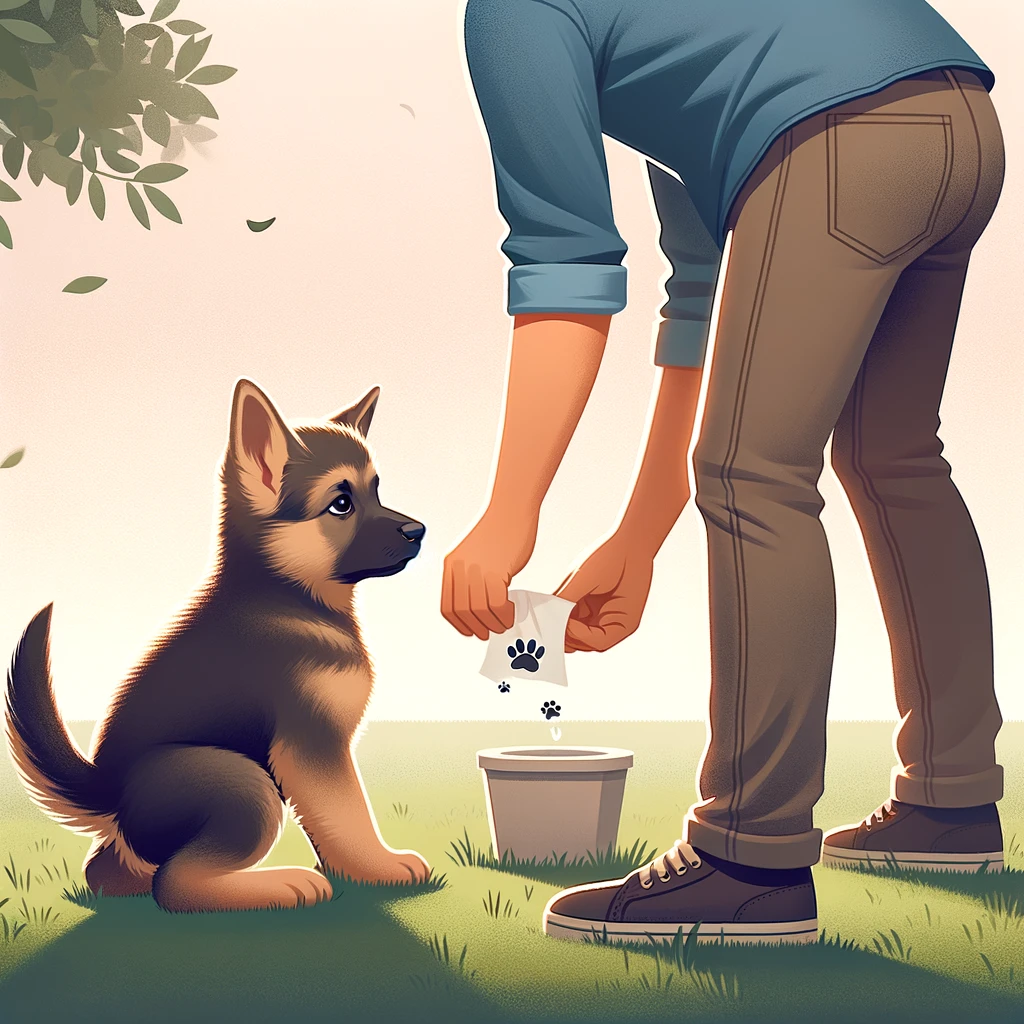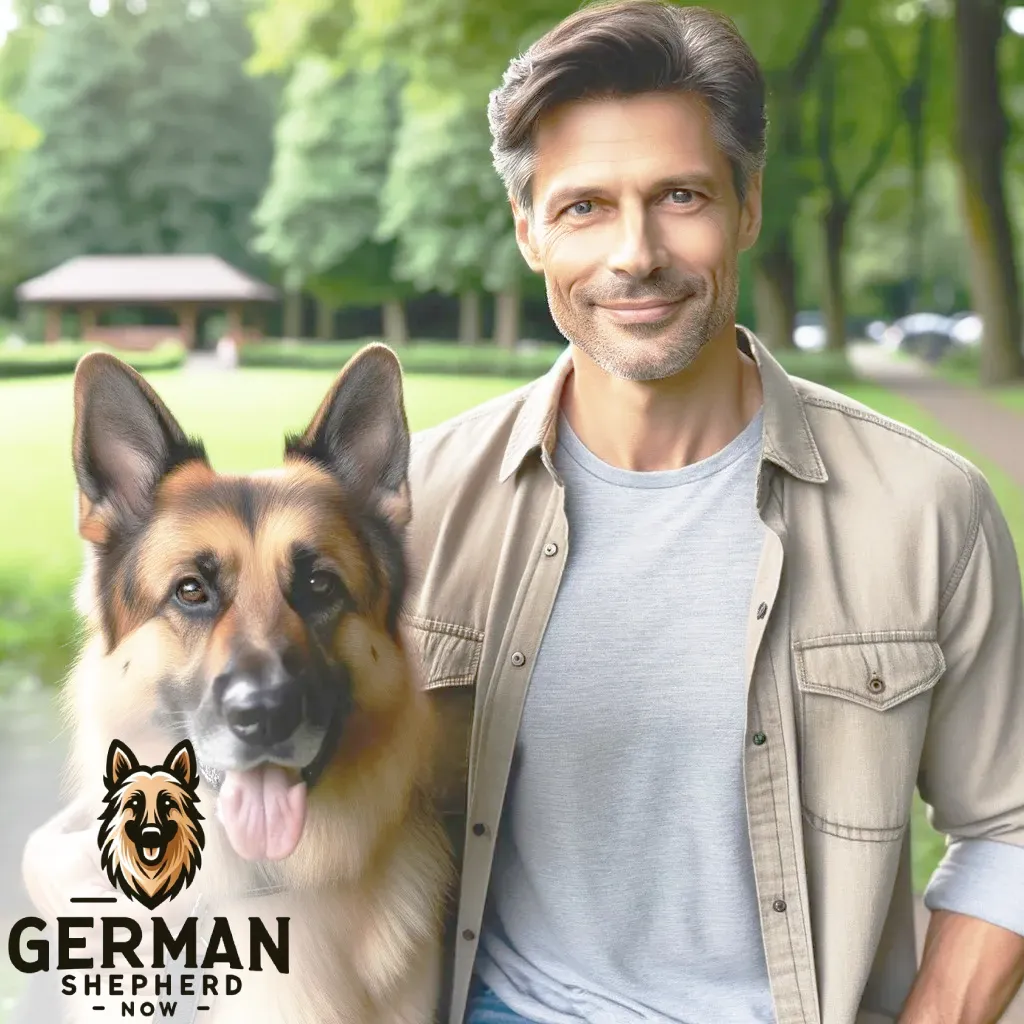How To Potty Train A German Shepherd Puppy

Establish a consistent feeding and bathroom break schedule to potty train a German Shepherd puppy.
Take your puppy outside to the same spot each time for potty breaks, ideally every 2-3 hours, after meals, first thing in the morning and last thing at night.
Use positive reinforcement, like treats and praise, when your puppy successfully goes to the bathroom outside.
Consistency, patience, and positive reinforcement are key, and remember that accidents are normal and part of the learning process.
6 Ways To Potty Train A German Shepherd Puppy
Potty training a German Shepherd puppy is an exercise in patience, diligence, and consistency.
But putting in the hard work during these critical months pays immense dividends through improved bonding, better behavior, and more freedom for both pup and owner.
The key is setting your clever canine up for success by creating predictability, rewarding progress, managing setbacks positively and trusting the process.
There will surely be frustrating cleanup and lots of lost sleep over the months it takes to fully house-train a German Shepherd puppy.
But I am approaching potty training with compassion and patience, which results in a well-adjusted, respectable canine citizen.
Follow these 6 key ways to potty train your German Shepherd puppy to ease the process and improve behavior, bonding, and freedom for all:
1. Setting Up the Potty Area
Introducing your German Shepherd puppy to the right potty area prepares them for success.
Choose an accessible spot in the yard and fill it with pee pads or fake grass to create a recognizable bathroom.
Take your pup there frequently, especially first thing in the morning, after meals, naps, and playtime. Reward them with treats and praise when they go to the designated area.
Be consistent and patient; they’ll learn this spot is where they should relieve themselves.
2. Scheduling Potty Breaks
German Shepherd puppies do best on a predictable schedule. When active and awake, take them outside to potty every 30 minutes.
Immediately take them to their bathroom spot after naps, meals, play sessions, or chew time.
Supervise closely and reward potties outside with high-value treats. Stick to the schedule, increasing times between trips as their bladder control develops.
Consistency and positive reinforcement make training easier for the pup and the owner.
3. Crate Training
Crate training utilizes a dog’s natural instinct to clean their sleeping area. Get a crate big enough for your German Shepherd to stand and turn around and place pee pads towards the back.
When not supervised, gently place them in the open crate with a chew toy.
Let them out every 30-60 minutes to go potty outside immediately, rewarding successes.
The more consistent you are, the faster they’ll learn to hold their bladder and bowels when created until their next outdoor trip.
4. Support Through the Night
Expect to lose sleep while potty training a German Shepherd puppy. Set an alarm every 2 hours to take them out to their bathroom spot. Silently praise potties outside, then return to bed. Ignore whines for attention but respond to signs they need to relieve themselves.
You can increase the duration between trips as they mature. Having patience through interrupted nights sets everyone up for restful nights down the road.
5. Manage Accidents Inside
Potty training is an inevitable, messy process with a puppy. When you catch them in the act of going inside, interrupt with a calm “eh-eh” and then immediately whisk them outside to finish. Thoroughly clean accidents with an enzymatic cleaner to remove odors.
Avoid punishment, as it can hamper progress and damage your bond. Stay vigilant and don’t allow unsupervised wanderings to prevent recursion. Manage setbacks positively and keep moving forward.
6. Trust the Process
Potty training any puppy requires immense diligence and consistency. There will be frustrating setbacks and cleanups along the months-long journey.
But your investment will pay off through a deeper bond and a good canine citizen.
Set reasonable expectations for their age and bladder control capability. The more positive reinforcement and predictability you provide, the faster your German Shepherd will learn this essential life skill, resulting in freedom for all.
German Shepherd Puppy’s Potty Signals
Understanding your German Shepherd puppy’s pre-potty signals and behaviors allows you to whisk them outside promptly before indoor accidents occur.
Pay close attention to pacing, sniffing, vocalizing, exiting cues, play pauses, and leg lifting so you can reinforce that potty time happens outdoors.
Pacing and Circling
An introduction of your German Shepherd puppy pacing around in circles inside is one of the most common pre-potty behaviors. The repetitive movement indicates their need to relieve themselves soon.
Stay alert to the signs of them walking around urgently, getting up, turning, and sitting back down in different spots.
When you observe this restless behavior, take them outside immediately to avoid indoor accidents.
Sniffing Intently
German Shepherd puppies searching for the perfect place to relieve themselves will sniff around the floors intensely. The increased sniffing behavior precedes urination or defecation.
When you observe your pup inspecting corners, carpets, and floors with their nose close to the ground, promptly guide them outside where it is appropriate to complete this natural behavior. Praise them upon pottying in the designated outdoor area.
Whining and Barking
Vocalizations from your German Shepherd puppy might indicate various needs, including wanting to go potty.
Pay attention to the context around whining or barking behaviors. If they occur around common potty times like early morning, after meals, following crated naps, or during play, immediately take the pup outside.
Learning the cues leading up to your unique pup’s signaling will help prevent indoor accidents.
Circling Near Exits
Smart German Shepherd puppies quickly learn to communicate their need to go outdoors. Begin watching for signs your understands doors lead outside.
Circling, sniffing near exits, gazing at doors, or gently pawing at thresholds all display an awareness that potty time happens alfresco.
Rushing pups outside when exhibiting these behaviors teaches them how to alert you they need to go properly.
Pausing During Play
In the heat of fun and games, your energetic German Shepherd pup might suddenly freeze or wander off from play. This pause in the action tends to indicate a pre-potty behavior rather than disinterest.
Make a habit of promptly interrupting spirited sessions to ask, “Do you need to go potty?” then guide them outside right away. This urges them to connect their urge to go with politely letting you know through a freezing pause.
Leg Lifting
Last, if your German Shepherd male puppy initiates a leg lift inside, this immediately signals imminent urination.
Make an abrupt “ah-ah!” interjection, then hustle them outside mid-stream to reinforce that peeing only happens in designated locations.
For especially enthusiastic leg lifters, attaching bells to doors can train them to alert you before impromptu indoor sprinkling sessions.
FAQs About German Shepherd Puppy Potty Training
Successfully house training your German Shepherd puppy requires patience, diligence, and knowing what to expect.
These 10 common questions address the timeline, process, best practices, and handling of inevitable setbacks that come with potty training this clever breed.
Understanding the normal challenges will help you set realistic expectations and get through frustrating accidents with compassion.
With the answers below, you can set your smart puppy up for success during this critical life-training phase.
Q. At what age can I start potty training my German Shepherd puppy?
- You can start introducing potty training concepts as early as 8 weeks old. However, at this age, it is more about establishing good habits around pottying than expecting bladder control. Create a consistent schedule and reinforce going potty outside, but expect many indoor accidents until at least 16 weeks.
Q. How long does it take to fully potty train a German Shepherd puppy?
- Plan for potty training to take about 4-6 months from start to being reliably house trained. German Shepherd puppies gain bladder muscle control around 6 months old, so consistent training will get them in the habit much faster. But expect backsliding, especially when overtired or busy playing.
Q. How often should I take my German
Shepherd puppy outside to potty? A. When awake and active, take your puppy out frequently, every 30 minutes. Go straight out after naps, meals, drinking water, or playtime. During the night, set alarms for potty breaks every 2 hours. Space out trips more as they age and gain control.
Q. What are the best potty training methods for German Shepherds?
- Use crate training, active supervision, regular schedules, confinement when unwatched, positive rewards for going outside, and appropriate responses to accidents. Never punish for indoor potties, but instead redirect the behavior.
Q. Where should I have my German Shepherd puppy potty outside?
- Choose a specific outdoor spot and take them there repeatedly. Use a verbal cue like “go potty” so they associate the location and command with relieving themselves. The smell triggers their instinct to go in that area. Always supervise to reward desired behaviors.
Q. Why has my German Shepherd puppy had so many accidents after doing well?
- Frequent accidents after making progress are very normal. These intelligent pups learn patterns and then test or revert when situations change. Manage setbacks calmly, clean thoroughly with an enzymatic cleaner, reinforce training, and trust the long-term trajectory over day-to-day variability.
Q. Why does my German Shepherd puppy potty right after coming inside?
- Going immediately upon returning inside usually signals you missed their cues and need to relieve themselves outside. Listen for whines at the door and allow enough time before returning. Associate go to their spot before coming home.
Q. What cleaning products should I use for German Shepherd potty messes?
- Use an enzymatic rather than detergent-based cleaner to eliminate odors that might attract them back to the area to potty again. Brands like Nature’s Miracle work extremely well for neutralizing the smell of urine, feces, or vomit.
Q. How do I potty train my German Shepherd puppy when I work?
- If you work away from home, carry them to one dog-proofed room or crate train while away. Hire someone to let them outside on a consistent schedule. Consider doggy daycare a few times a week or arrange a midday potty break from family, friends, or professional pet sitters.
Q. What discipline methods work best for German Shepherd accident corrections?
- Avoid punishment, yelling, rubbing noses in it, or other forms of scolding. Instead, calmly interrupt the behavior, redirect to the desired location, and thoroughly clean afterward. Respond with patience every single time. Harsh discipline damages trust and can inhibit potty training progress.
Mastering Potty Training: German Shepherd Puppies
Potty training a German Shepherd puppy requires patience and consistency. Start by setting a regular feeding and bathroom breaks schedule, taking them outside to the same spot every 2-3 hours, including after meals first thing in the morning and last thing at night.
Use positive reinforcement like treats and praise for successful outdoor bathroom trips.
Accidents are normal and part of the learning process, so maintain a patient and consistent approach for the best results. This method promotes good habits and strengthens the bond between you and your puppy.

I’m Martin, and I grew up in the super cool city of Seattle. You know, the place with all the incredible mountains and forests? Yeah, that’s my playground!
Ever since I was little, I’ve been all about nature. I used to wander around the woods with a notebook, doodling all the cool plants and animals I’d find.
